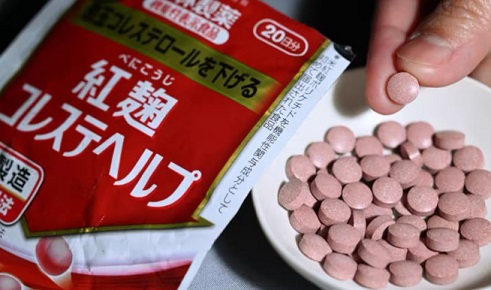Red Rice Supplements To Lower Cholesterol From Japan Causes 157 To Be Hospitalized And 5 To Die With Many Across Asia Possibly Affected!
Nikhil Prasad Fact checked by:Thailand Medical News Team Apr 02, 2024 1 year, 1 week, 6 days, 12 hours, 40 minutes ago
Nutritional Supplements: In recent weeks, a health crisis stemming from Japanese dietary supplements containing red yeast rice has escalated, causing alarm not only in Japan but also across Asia. The situation has resulted in numerous hospitalizations, deaths, and reports of kidney-related health issues, prompting widespread concern and intense scrutiny. This
Nutritional Supplements news report delves deep into the unfolding crisis, providing a thorough examination of its origins, ongoing investigations, global impacts, and the broader implications for the supplement industry and public health.
 Red Rice Supplements To Lower Cholesterol From Japan Causes 157
Red Rice Supplements To Lower Cholesterol From Japan Causes 157
To Be Hospitalized And 5 To Die With Many Across Asia Possibly Affected
(Pic Credit: Nikkei Asia, Suzu Takahashi)
The Initial Unveiling: 157 Hospitalized Over Health Issues Linked to Beni Koji
The crisis began to gain significant attention when the number of hospitalizations tied to Kobayashi Pharmaceutical Co.'s supplement products containing red fermented rice, known as “beni koji,” reached 157 individuals. This startling figure, which also included five deaths associated with the supplements, prompted urgent inquiries and a heightened focus on the safety of these products. Kobayashi Pharmaceutical faced a deluge of over 22,000 consultation requests from concerned consumers, reflecting the widespread alarm caused by the red rice supplements.
The Root of the Crisis: Health Scare in Japan
The heart of the health scare lies in dietary supplements containing red yeast rice, which are primarily marketed as cholesterol-lowering aids. Kobayashi Pharmaceutical, a prominent player in Japan's health industry, came under intense scrutiny after linking its products to hospitalizations and deaths. Investigations are currently underway to ascertain whether these supplements directly caused the reported health problems, particularly those related to kidney issues, which have been a focal point of concern.
Understanding Red Yeast Rice and Its Risks
Red yeast rice, a product of rice fermented with a mold culture, has a long history of usage in East Asia for various purposes, including culinary and medicinal applications. However, recent revelations of potentially toxic substances in red yeast rice supplements have raised serious health concerns. Kobayashi Pharmaceutical's detection of a toxic acid in its products prompted an immediate recall and heightened regulatory inspections, shedding light on the need for rigorous quality control measures in the supplement industry.
Global Ramifications: Impact Beyond Japan
The ramifications of the red rice supplement crisis extended beyond Japan's border
s, with Taiwanese authorities also reporting cases of illness and implementing preventive recalls of products containing red yeast rice. This incident underscores the interconnected nature of global health risks associated with dietary supplements and the imperative for international collaboration in addressing such crises effectively.
Red rice supplements from Japan are also very sought after in countries like Singapore, Malaysia, Indonesia, Philippines, Thailand, Vietnam, Taiwan and South Korea. Health authorties these countries are worried that many could be affected by these red rice supplement s from Kobayashi Pharmaceutical.
Taiwanese Travel Advisory: Safety Measures Amidst the Crisis
In response to the escalating health crisis, Taiwan's Foreign Ministry issued advisories urging travelers to Japan to avoid products containing red yeast rice. With over 150 individuals hospitalized and five deaths reported in Japan, precautionary measures are crucial to mitigate further health complications among consumers and travelers alike.
Analyzing Patient Data: Insights from the Japanese Society of Nephrology
A comprehensive study conducted by the Japanese Society of Nephrology provides invaluable insights into patient demographics, health issues, and trends related to red yeast rice supplements. The study revealed that approximately 80% of affected individuals sought medical attention in January or later, indicating a recent surge in health problems linked to these supplements. Furthermore, the study highlighted common symptoms, treatment approaches, and regional sales data of the implicated products, offering a holistic view of the crisis's impact on public health.
The Ongoing Investigation: Unraveling the Cause
As investigations persist into the root cause of the health crisis, Kobayashi Pharmaceutical has identified puberulic acid, a natural compound produced by blue mold, in its supplement ingredients. This discovery has raised pertinent questions about manufacturing processes, quality control measures, and regulatory oversight within the supplement industry. Efforts are underway to determine the precise role of puberulic acid in the reported illnesses and to implement corrective measures to prevent future occurrences. The company has already initiated a recall of all its supplement products.
https://www.kobayashi.co.jp/index.html
Lessons Learned and Future Precautions
The red rice supplement crisis serves as a poignant reminder of the critical importance of stringent safety standards, robust regulatory frameworks, and transparent communication in the dietary supplement industry. Governments, healthcare providers, industry stakeholders, and consumers must collaborate closely to ensure the safety, efficacy, and transparency of health products, thereby mitigating risks and addressing emerging health threats promptly and effectively.
Conclusion
The unfolding red rice supplement crisis originating from Japan has reverberated widely, triggering significant concern, rigorous investigations, and precautionary measures. This multifaceted analysis has provided a comprehensive overview of the crisis, spanning its origins, impacts, ongoing investigations, global ramifications, and lessons for the supplement industry and public health. As stakeholders continue to navigate and respond to this crisis, it underscores the urgent need for proactive measures, enhanced safety protocols, and collaborative efforts to safeguard public health and restore consumer confidence in dietary supplements.
For the latest on
Nutritional Supplements, keep on logging to Thailand Medical News.
